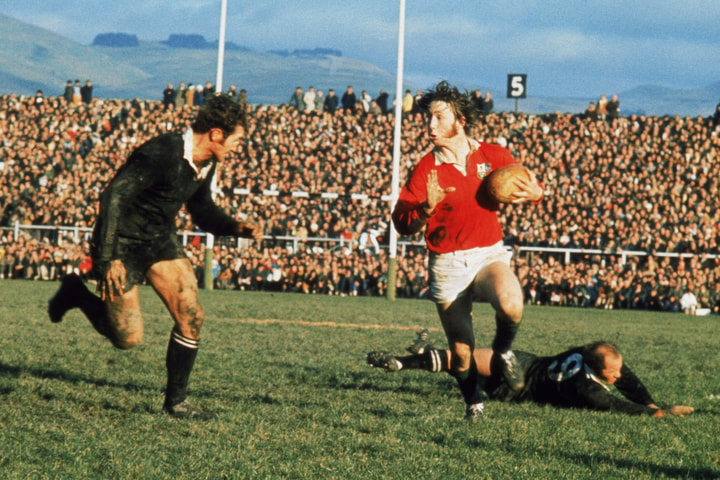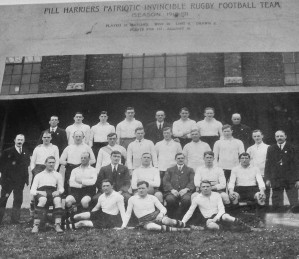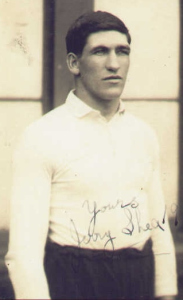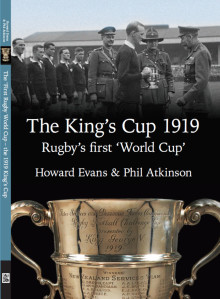
18 January 2026


Rodney Parade 19th century
When Newport staged one of the games in the six-team Inter Services Championship (King's Cup) in March 1919, Australia beating South Africa 6-5 in March 1919, a Newport man who was to be a South African cap was in the 'Springbok' line up.

Taffy Townsend
William Henry 'Taffy' Townsend was born in the town on 12th March 1896, and had just celebrated his 23rd birthday when he played in the Rodney Parade clash. Having moved to South Africa, where he played for the Old Collegians Club and Natal, 'Taffy' was a strong and stocky scrum half who became a corporal in the SA Infantry in the War. He was a diamond digger by trade, but when the troops remaining for the moment in the UK in 1919 were chosen to play in this big Services 'World Cup' for a Cup presented by George V, it was scrum ball he went digging for. He did well, too, scoring a try in the earlier win over the RAF and the later victory against Canada (try and conversion) and defeat by the Mother Country (try). He couldn't prevent the narrow defeat by the Aussies at Newport, though. When the All Black Army side, who won the trophy in a play-off against the Mother Country, toured South Africa on their way home, who should they meet, playing on two occasions for Natal, but Taffy. Natal lost both clashes, but Taffy dropped a four-point goal in the second, and when South Africa travelled to NZ for the first ever Test between those giants of the game in August 1921, he won his only cap in a 13-5 reverse. He also served in World War Two, and lost his life in action at Catania in Sicily in January 1943, aged 46. The book also notes another man of Monmouthshire who played for Newport and South Africa, helped start the British Army Rugby Union and refereed the Challenge Match at Twickenham, when Cup-winners NZ beat France, a few days after the Final.

Bird Partridge
Joseph Edward Crawshay Partridge, known as 'The Bird', born in 1879 at Llanthewy Court, Monmouthshire. He went to Dulwich College, and made 188 appearances for Newport in two spells between 1898-1901 and 1904-11. He also played for London Welsh, Blackheath (skipper 1907-8) and Kent, and got an England trial in 1906. He played 19 times for the Barbarians. Partridge was a lieutenant in the 2nd Batallion, Welch Regiment in the Boer War, and whilst serving played for the Civil Service Rugby Club in Pretoria. In 18 days he played against the 1903 GB side four times, with two wins and a draw: a debut victory in Transvaal's 12-3 win on August 8, another triumph two weeks later by 14-5, a Springbok cap in a 10-10 draw in the First Test and a 15-3 defeat for Pretoria. Stationed back in London and on a train heading to Scotland with Blackheath in 1906 he apparently had the idea of forming an Army rugby team. He discussed it with his travelling companions and teammates, Lieutenant W S D Craven (Royal Field Artillery) and Lieutenant (later General Sir Clive) C G Liddell (Leicestershire Regiment) and a meeting was held on November 12, 1906 to form the ARU. 'Bird' won Army caps in 1907, '08, '09 (captain) and '10, and won the Army Cup with the Welch Regiment in 1912 and 1913, when they also took the Aldershot Command Cup. Later a lieutenant-colonel, he died in Abergavenny in 1965 at the age of 86 and his cap was presented to the Regimental Museum.

Pill Harriers, 1918-1919
Pill Harriers were one of a few sides who were able to keep going during World War One, and they were rarely beaten: never, in 1918-19. They had beaten a host of Services sides of various nationalities over previous wartime seasons, and on St David's Day 1919 the Canada Squad for the King's Cup were crushed 43-0 by Pill.

Jerry Shea
In April they played their 27th consecutive unbeaten match when they drew 0-0 with a very strong NZ Services 'B' XV in front of 10,000, and ten days later beat the Australian Services 12-3. In May one of their own, the rugby (union and league), boxing and sprinting star Jerry Shea, dropped the goal for Monmouthshire to beat the NZ Services 4-3 at Ebbw Vale, one of their only two defeats that year. Jerry was to be capped four times for Wales, 1919-21, and earned lasting fame by becoming the first player at international level to achieve the 'full house' of a try, conversion, drop and penalty (then 16 pts.) when Wales beat England 19-5 in 1920. He turned professional with Wigan for a then record £700 in 1921.

About the Author - Phil Atkinson is a former History teacher and Headteacher. He is President of Rhymney RFC and Editor of 'Touchlines', the magazine of the Rugby Memorabilia Society. He is the author of the Centenary History of Rhymney RFC and joint author of The King's Cup 1919: Rugby's First 'World Cup', published by St David's Press. Great Newport rugby figures and fixtures of the past will be recalled at an event open to the public at Rodney Parade at 7 pm on Monday 14th December. Memorabilia from the days of a century or more ago, some of it newly discovered and never seen outside the club, will be on display, too, in a rare opportunity. Several Newport and Pill personalities are featured in the new book on Rugby's first World Cup, the King's Cup 1919, which will be launched on the night by St David' Press in association with the Friends of Newport Rugby Trust and the Rugby Memorabilia Society.